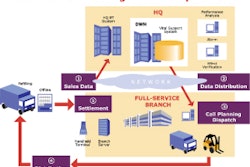Atlanta — September 14, 2007 — Growing contract complexity and increased compliance requirements and risks have raised executives' awareness of the need to better negotiate and manage corporate contracts, according to a new study from the International Association of Contract and Commercial Management (IACCM).
The study, which was sponsored by solution provider Procuri, finds that users of contract lifecycle management (CLM) software solutions have been able to overcome these challenges and improve contracting and agreement management controls, compliance, efficiency and overall effectiveness.
"IACCM has advocated for the adoption of contract management software for nearly 10 years. Our benchmarks have illustrated that the benefits for most organizations are significant — 60 percent of companies implementing CLM software applications are 'satisfied' or 'very satisfied' with the outcome," said Tim Cummins, president of IACCM and author of the report, "Contract Management Software: Market Sizing and Status Report."
Contract Automation Lagging
Unfortunately, only one-third of study respondents report using some form of contract management automation. Less than 20 percent have implemented contract management automation across their organization.
"It's time for companies to take a hard look at their current processes and understand the value software can bring to their organization, both from a functionality and process standpoint," added Cummins.
At the same time, the study found that demand for CLM solutions is on the rise among all enterprises. Furthermore, even those companies that have already automated portions of the contract management process are now looking for more robust and complete solutions.
Some Sectors Ahead of the Curve
The sectors with the highest level of existing systems, either enterprise-wide or partial, were technology/software, telecommunications and banking/insurance/financial services, with a 40 percent penetration rate, according to the study. The electronics and transport/logistics sectors report a 61 and 46 percent planned software acquisition for 2007-2008, respectively.
In terms of company size, the richest opportunities reside in the $500 million to $10 billion segments, with about 40 percent declaring themselves as either in the process or planning to acquire CLM software.
Tim Minahan, Procuri's senior vice president of marketing, said that the study results have been backed up by the successes that companies using Procuri's own TotalContracts solution have experienced. "Companies like Toyota Motor Sales, which touts triple-digit savings results, and BlueCross BlueShield of Florida, that cites standardized processes for its tens of thousands of contracts, are just two examples of the power behind an on demand CLM solution," Minahan said.
Minahan was recently nominated to serve on IACCM's newly formed editorial board.
The IACCM report is available for free download (registration required) at http://www.procuri.com/knowledgecenter/whitepapers.asp?display=whitepaper_14.
The study, which was sponsored by solution provider Procuri, finds that users of contract lifecycle management (CLM) software solutions have been able to overcome these challenges and improve contracting and agreement management controls, compliance, efficiency and overall effectiveness.
"IACCM has advocated for the adoption of contract management software for nearly 10 years. Our benchmarks have illustrated that the benefits for most organizations are significant — 60 percent of companies implementing CLM software applications are 'satisfied' or 'very satisfied' with the outcome," said Tim Cummins, president of IACCM and author of the report, "Contract Management Software: Market Sizing and Status Report."
Contract Automation Lagging
Unfortunately, only one-third of study respondents report using some form of contract management automation. Less than 20 percent have implemented contract management automation across their organization.
"It's time for companies to take a hard look at their current processes and understand the value software can bring to their organization, both from a functionality and process standpoint," added Cummins.
At the same time, the study found that demand for CLM solutions is on the rise among all enterprises. Furthermore, even those companies that have already automated portions of the contract management process are now looking for more robust and complete solutions.
Some Sectors Ahead of the Curve
The sectors with the highest level of existing systems, either enterprise-wide or partial, were technology/software, telecommunications and banking/insurance/financial services, with a 40 percent penetration rate, according to the study. The electronics and transport/logistics sectors report a 61 and 46 percent planned software acquisition for 2007-2008, respectively.
In terms of company size, the richest opportunities reside in the $500 million to $10 billion segments, with about 40 percent declaring themselves as either in the process or planning to acquire CLM software.
Tim Minahan, Procuri's senior vice president of marketing, said that the study results have been backed up by the successes that companies using Procuri's own TotalContracts solution have experienced. "Companies like Toyota Motor Sales, which touts triple-digit savings results, and BlueCross BlueShield of Florida, that cites standardized processes for its tens of thousands of contracts, are just two examples of the power behind an on demand CLM solution," Minahan said.
Minahan was recently nominated to serve on IACCM's newly formed editorial board.
The IACCM report is available for free download (registration required) at http://www.procuri.com/knowledgecenter/whitepapers.asp?display=whitepaper_14.












